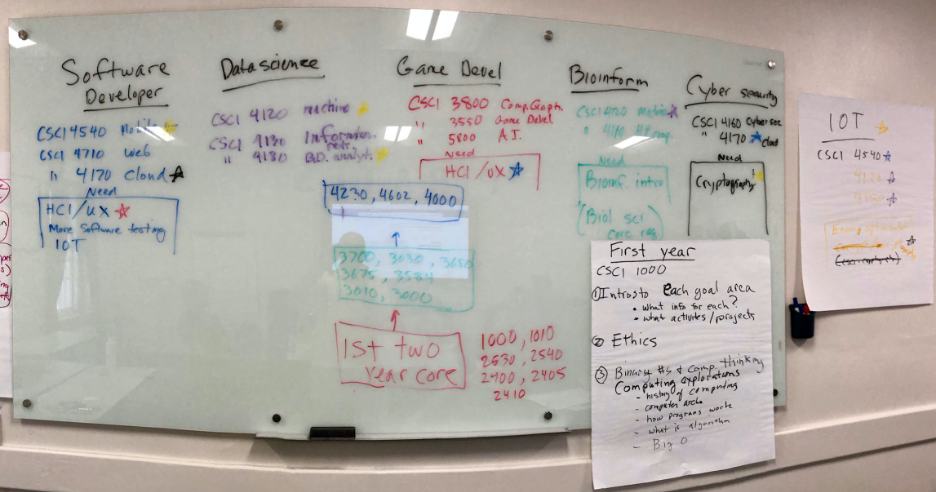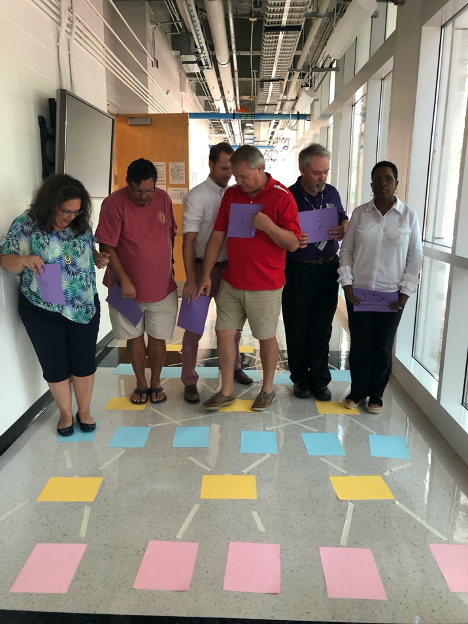Visit to UNC Charlotte
In February 2019, some ECU computer science faculty visited the UNC Charlotte computer science department. UNC Charlotte was also funded by NSF Grant #1519160: IUSE/PFE: RED: The Connected Learner: Design Patterns for Transforming Computing and Informatics Education.
This visit was a learning opportunity for ECU Computer Science faculty to learn how UNC Charlotte had addressed similar issues to those at ECU in computer science education.
As a result of this visit to UNC Charlotte, ECU Computer Science faculty learned that:
-
Active learning strategies result in meaningful in-class experiences and student learning.
-
Computer science faculty need professional development about teaching and learning pedagogies.
-
Change related to instructional pedagogies is embraced by some faculty but there is a subset of faculty that resist change.
Impact of visit to UNC Charlotte Computer Science RED project team:
-
ECU Computer Science faculty formed a professional learning community to learn about active learning and incorporate into their lessons.
-
Drafted a vision for PPSE Team: Transform undergraduate computer science education to develop versatile, resourceful, and diverse professionals.
-
Enlisted the expertise of professor John Stiller to lead the learning community with professor Marjorie Campo Ringler.

Faculty generated descriptions of Computer Science areas of study from 2019 summer learning community meetings. These documents were communicated to the Computer Science academic advisor to help with student advising.
-
Learning community consisting of six computer science professors met in Summer 2019 to learn about active learning and project-based learning.
-
The learning community also developed a flow-chart of the course offerings that outlined listing of several computer science areas of expertise at ECU.
ECU Computer Science areas of study
Data Science
Organize, analyze , visualize, and extract information from large volume of data. For example, twitter, Facebook, internet data. Sample jobs: business analyst, data analyst, data engineer, data scientist, data architect, machine learning engineer, research engineer, search and information retrieval engineer, and natural language processing engineer.
Software Development
Create software solutions to application areas limited only by your imagination. For example, build apps, scientific engineering, business, entertainment, recreation. Sample jobs: software engineers/developer, software architects, software testers, and software requirements analysts.
Game Development
Design, implement, and test components needed for computer games. For example: storylines, characters, graphical elements, programming, game logic, and artificial intelligence. Sample jobs: game designer, game developer/programmer, game tester, game producer, programmer, lead game designer.
IoT (Internet of Things)
Design, implement, and test sets of systems, sensors, and devices that are connected to achieve a goal such as facilitating living places by automation of daily tasks. For example: using mobile app to check on house status. Sample jobs: product manager, solution engineer, IoT architect.
Bioinformatics
Analyze human vital data to generate statistics and patterns for medical experts. Sample jobs: public health, biostatistician, and health management.
Course revision - CSCI 1000: Explorations in computing
Faculty discussed course revisions to provide students the opportunity to understand what the major in computer science entails. The goal is to use this course for advising in addition to learning basic knowledge in computer science. Students will know more about the program and will make an informed decision on whether to choose computer science as a major or to choose a different degree.
Collaborations with middle and high school teachers and students
We initiated a learning community with high school, middle school teachers, computer science faculty
Step 1
Computer Science (CS) Faculty often expressed their frustration about CS students in the first few courses in the program. The frustrations were based on the faculty’s perception of the lack of preparation students exhibited in the topics of mathematical thinking, computational thinking, and coding experiences. For this reason, the PPSE grant faculty, Dr. Rui Wu, Dr. Venkat Gudivada, Dr. Qin Ding, Dr. Marjorie Ringler, and CS students visited two schools: North Pitt High School and Innovation High School at ECU.

A team of middle and high school teachers and Joel Sweatte engaged in a computational problem-solving activity.
The CS faculty provided an orientation about ECU Computer Science to high school juniors and seniors. This orientation included various stations that featured hands on experiences with computer science concepts. The concepts were Artificial Intelligence, Virtual Reality, and Jobs and Careers related to Computer Science. One goal was to determine if these types of activities would help high school students be better informed when they decide to pursue a computer science degree. Another goal was to entice these students to choose ECU for their college education. This orientation was attended by 60 juniors and seniors from North Pitt High School.
Step 2
Two faculty from the PPSE Grant, Joel Sweatte and Marjorie Ringler, planned the objectives and activities for a learning community with middle and high School teachers to study the preparation secondary students received prior to enrolling in the B.S. in Computer Science at ECU.
